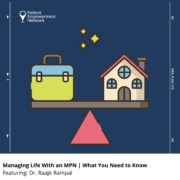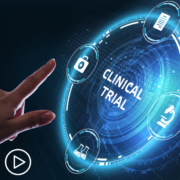Tools to Help You Learn More About MPN Clinical Trials
Tools to Help You Learn More About MPN Clinical Trials from Patient Empowerment Network on Vimeo.
Research is quickly evolving for essential thrombocythemia (ET), polycythemia vera (PV), and myelofibrosis (MF), all due to clinical trials. Dr. Laura Michaelis reviews tools for learning about clinical trials and how you can get involved.
Dr. Laura Michaelis is hematologist specializing in myeloproliferative neoplasms (MPNs) at Froedtert & the Medical College of Wisconsin, where she also serves as Associate Professor of Medicine. Learn more about Dr. Michaelis here.
Related Resources

|

|

|
Transcript:
Dr. Michaelis:
So, there’s lots and lots of research going on in the field of myeloproliferative neoplasms. One of the best ways to stay informed about this is to check on something called clinicaltrials.gov, which is a national website that warehouses clinical trials in the disease that you might have.
So, if you look up essential thrombocythemia or you look up myelofibrosis, it will show you the clinical trials that are going on in your region, in your state, or in the country. So, that’s a nice way to begin to look and see what’s available.
The other way, of course, is to talk to your doctor. And each institution has a list of clinical trials that they have open, based on what a person’s diagnosis is, what their age is, what other, for example, health issues that they might have. And so, again, when you’re talking to your doctor, say – Is there something I should be thinking about, in terms of clinical trials?
There are clinical trials going on in all facets of the disease – not just in treatment, which is what you often think about. Treatment for symptoms or treatment for ways to control the disease. There are new medicines coming down the road, in terms of what to do when somebody is no longer responding to treatment. Or how can we combine treatments together? Those are important trials, and those are things that people should talk with about their physician.
But there’s also clinical trials on symptom management, and those can sometimes be a trial that you would do online yoga or dietary trials. And there’s trials on familial syndromes, meaning – Yeah, I have polycythemia vera, and my aunt had myelofibrosis, and her daughter has ET. Well, that is a family that should be investigated. And sometimes we find that – even nationally, we find that we’re networking with one another and collecting patients who have family histories so we can learn more about that.
So, there’s a variety of different types of clinical trials. Those are things to talk to your doctor about. And on your own, you can search them out on clinicaltrials.gov or through patient advocacy organizations.










